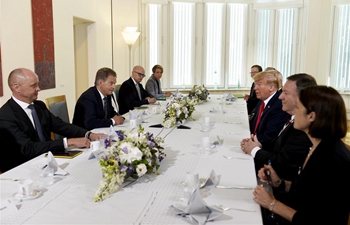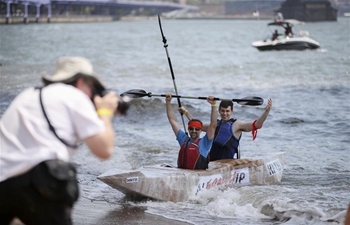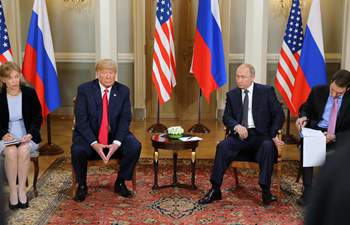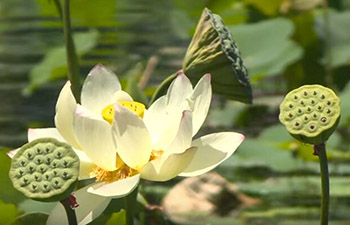WASHINGTON, July 16 (Xinhua) -- The first one-on-one meeting between U.S. President Donald Trump and his Russian counterpart Vladimir Putin in Helsinki, Finland, is more notable for its friendly atmosphere than for concrete accomplishments, said U.S. experts.
MORE SYMBOLIC THAN SUBSTANTIAL
The two leaders voiced their satisfaction with the meeting as a "very constructive" one marking the "first important step" towards better ties, though both acknowledged problems remain in Syria, Ukraine and Crimea.
The two sides have also failed to reach an agreement to extend the New Strategic Arms Reduction Treaty (New START), which was thought possible before the meeting by analysts.
Their joint press conference was overshadowed by media questions about Moscow's alleged meddling with U.S. elections, despite Putin's categorical denial of any interference in them and Trump's attacking of the findings of U.S. intelligence agencies.
William Courtney, a former U.S. ambassador and now a senior fellow of RAND Corporations, noted that the two sides have not issued any joint statement concerning major disputable issues in U.S.-Russian relations.
"It was not apparent that significant progress was made, or even that all of these issues were addressed in detail," he told Xinhua.
He added that perhaps the Trump administration did not want to have a statement with Putin that "could be vulnerable to political fire, especially in the Congress."
"Since no progress was evident on any of the major differences between the U.S. and Russia, the summit may not have done much to mend bilateral ties," he said. The meeting "was more notable for friendly atmospherics than for concrete accomplishments."
In the press conference, Putin seemed to have offered to extend the New START treaty, which limits long-range nuclear arms, but Trump has been noncommittal. The treaty, to expire in 2021, has won bipartisan support in the U.S. Congress for extension unless replaced by a better one.
Lt. Col. Daniel L. Davis, a retired U.S. army officer and currently a defense expert at Defense Priorities, a think tank, however, told Xinhua that Trump's expectations going in to the meeting were essentially to improve relations with Russia and to establish a rapport with Putin, and "based on the performance of both presidents at the post-summit press conference, it appears he succeeded."
"No one wins a nuclear war, and thus Trump is taking prudent steps to increase understanding and establishing lines of communication between the two to keep the danger of future nuclear war low," he said.
The defense expert said that despite the good faiths the two presidents wished to extend in the meeting, it has been difficult for the United States to make advancement on the Crimea issue.
"U.S. interests must come before our preferred political outcome on Ukraine and Crimea, and we gain little by pressing Russia to meet our preferences on a matter they are clearly not going to give in on," Davis said.
"Only time will tell how the apparent good result of the summit will translate in tangible ways in the future," he said.
CONTROVERSIAL DENIAL OF MEDDLING WITH ELECTIONS
"Could you name a single fact that would definitively prove the collusion? This is nonsense," Putin said in the press conference, responding to allegations of Russian meddling in U.S. elections. "There's no evidence when it comes to the actual facts, we have to be guided by facts not by rumors."
Trump repeated Putin's denial of involvement in the election, saying: "I will say this: I don't see any reason why it would be."
Concerning alleged Russian meddling in Western nations' elections and Putin's repeated denial of it, Courtney said difficult negotiations lie ahead for both sides.
Moreover, Courtney said, the West is unlikely to provide the large-scale aid that Russia seeks for the reconstruction of war-torn Syria unless Moscow extends more commitment to a political solution and to reducing Iran's role there.
Trump's behavior at the meeting has also raised suspicion among some U.S. experts.
"The most striking feature of what we know ... was Trump's refusal to back the assessments of his own intelligence and law enforcement agencies," said Richard N. Haass, president of Council on Foreign Relations.
BIPARTISAN "FIRE AND FURY"
Trump's reconciliatory tone with Putin and his aggressive attitudes towards NATO allies have also sparked wild and wide criticism among lawmakers of both parties in his country.
"For the president of the United States to side with President Putin against American law enforcement, American defense officials, and American intelligence agencies is thoughtless, dangerous, and weak. The president is putting himself over our country," Chuck Schumer, a Democratic veteran senator, tweeted.
"Starting with the president's trip to NATO and ending with his shameful performance at today's press conference, @realDonaldTrump has strengthened our adversaries while weakening our defenses and those of our allies," Schumer said.
His statement echoed that of Republican Senator John McCain, who is also the chairman of the Senate Armed Services Committee.
"President Trump proved not only unable, but unwilling to stand up to Putin. He and Putin seemed to be speaking from the same script ...," he said in a statement.
"Helsinki should not be viewed in a vacuum," said Haass. "It was a worrisome and in many ways objectionable finale to a week that did much to undermine the foundations of U.S. foreign policy -- especially NATO and the U.S.-U.K. special relationship -- that have contributed so much to U.S. security, prosperity and influence for the better part of a century. Alas, the trip provided nothing that would take their place."
In his defense, Trump tweeted after the meeting that "I would rather take a political risk in pursuit of peace, than to risk peace in pursuit of politics."
"I have GREAT confidence in MY intelligence people," Trump tweeted. "However, I also recognize that in order to build a brighter future, we cannot exclusively focus on the past -- as the world's two largest nuclear powers, we must get along!"













